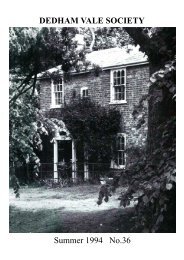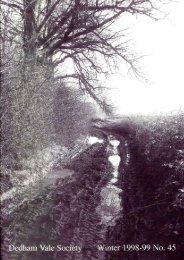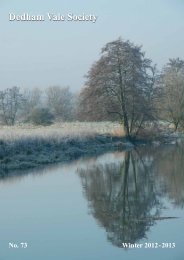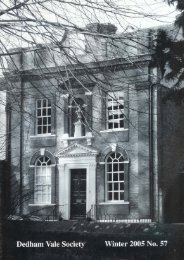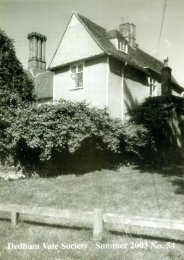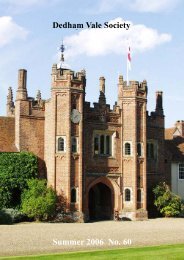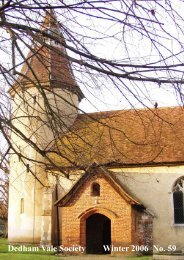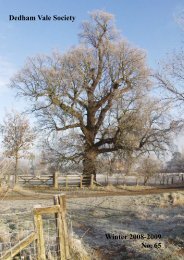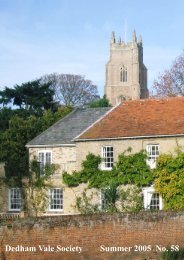Dedham Vale Society Winter 2007 No 61
Number 61 - Winter 2007 pdf 1.3Mb - Dedham Vale Society
Number 61 - Winter 2007 pdf 1.3Mb - Dedham Vale Society
- No tags were found...
Create successful ePaper yourself
Turn your PDF publications into a flip-book with our unique Google optimized e-Paper software.
His main interest begins in Victorian times, his chief source being a fellow called JosephGlass who was born in Colchester, who lived in Manningtree as a boy and who published inl855 Reminiscences of Manningtree and its Vicinity. (It was Joseph Glass who inventedextendable chimney brushes – the origin of what we use today – which meant the end ofchild chimney sweeps.) Glass’s Reminiscenses are written in appalling verse which is greatfun to read and he gives you all the important facts, for instance that in the early nineteenthcentury there were 24 pubs in Manningtree, 16 in Mistley:Houses with painted signs as we have seen,Are places of resort where men conveneOn business matters: they attend at first,Then take a glass or two to quench their thirst.Half pints they quaff, of ale, or stout, or porter,And smoke and drink their rum and gin and water.Meanwhile their business is so much extended –‘Tis hard indeed, to tell when’t will be ended.‘Tis night! – one leaves for home with staggering gait,But is not seen, as it is getting late.”The most exciting time to live here, David Cleveland thinks, would have been before therailway was built in l846. It took 36 hours to get to London by a coach, starting from Harwich,called The Defiance which rather ruled out commuting, but there was a lot going on here - apartfrom all the jolly drinking -particularly in Mistley. They were building ships on the quay, theRigbys had grand ideas for building a spa, and the Edward <strong>No</strong>rman was building the maltings.The population of Mistley almost doubled between 1841 and 1851, there were no drains,no paving on the streets and the whole place stank. People caught typhoid and cholera. Inthese antiseptic times, it’s hard to imagine the smells. Privies were emptied twice a year.Otherwise, waste of all kinds was chucked into the street. <strong>No</strong>t only that, but manure andwaste were shipped down by barge from London, piled up on Mistley quay and spread on theland. “A glass of water,” said David Cleveland, “would have things floating in it.” A lot ofsewage ended up in the estuary. (Indeed, before they built the sewage plant between the<strong>No</strong>rwich and Harwich lines in the 1970’s, they were still emptying sewage into the river, ashe could see from his boat.)“In l916, sailing barges and big fishing boats would come from London to Manningtree.The river was very active. They fished for flounders and winkles and cockles and whelks,all sold at the door. At Mistley quay coal would be unloaded on to the lighters which wentup to <strong>Dedham</strong> and Sudbury. They would be poled along until Brantham lock. You werenow in fresh water and the horses on the banks on the other side of the lock would draw thelighters up to Sudbury. There was a brick works in Sudbury and the lighters would bringbricks back to Mistley and load them on to barges to go to London .There were still quite a lot of smells when he came to live here in l969: “The plasticsfactory at Brantham smelt awful but, until the seventies, there was a sawmill down on thequay which smelt lovely.” And there was always the sweet almond smell of the maltingswafting down from Mistley.22



